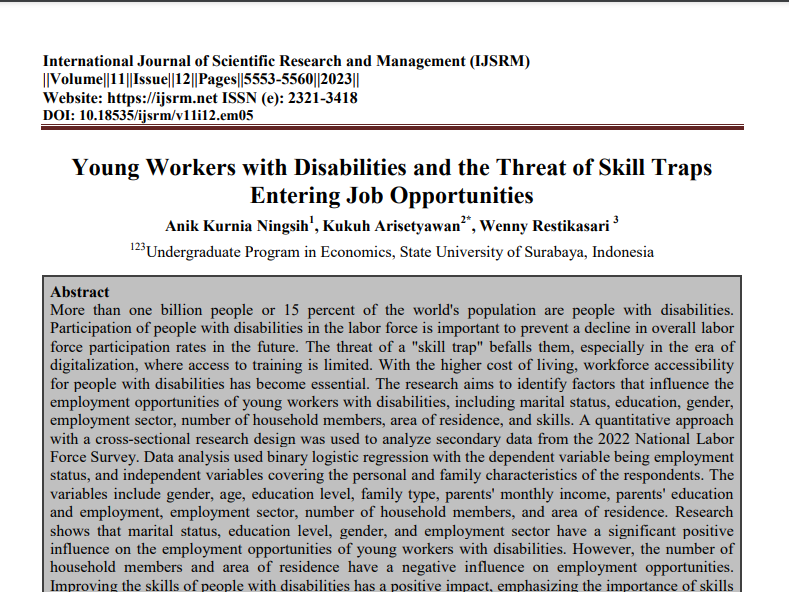
Submission to VIJ 2023-12-10
Keywords
- Skill Trap,
- Disability,
- Young Workers,
- Employment,
- Labor Market
Copyright (c) 2023 Anik Kurnia Ningsih Ningsih, Kukuh Arisetyawan, Wenny Restikasari

This work is licensed under a Creative Commons Attribution 4.0 International License.
Abstract
More than one billion people or 15 percent of the world's population are people with disabilities. Participation of people with disabilities in the labor force is important to prevent a decline in overall labor force participation rates in the future. The threat of a "skill trap" befalls them, especially in the era of digitalization, where access to training is limited. With the higher cost of living, workforce accessibility for people with disabilities has become essential. The research aims to identify factors that influence the employment opportunities of young workers with disabilities, including marital status, education, gender, employment sector, number of household members, area of residence, and skills. A quantitative approach with a cross-sectional research design was used to analyze secondary data from the 2022 National Labor Force Survey. Data analysis used binary logistic regression with the dependent variable being employment status, and independent variables covering the personal and family characteristics of the respondents. The variables include gender, age, education level, family type, parents' monthly income, parents' education and employment, employment sector, number of household members, and area of residence. Research shows that marital status, education level, gender, and employment sector have a significant positive influence on the employment opportunities of young workers with disabilities. However, the number of household members and area of residence have a negative influence on employment opportunities. Improving the skills of people with disabilities has a positive impact, emphasizing the importance of skills development in increasing their accessibility in the labor market.
References
- Fajri N, Ramadhan MN, Palani H, Yazid EK. Kajian Disabilitas, Tinjauan Peningkatan Akses dan Taraf Hidup Penyandang Disabilitas Indonesia: Aspek Sosioekonomi dan Yuridis. Jakarta: Bappenas; 2021. 89 p.
- O’Day B, Stapleton D. Transforming Disability Policy for Youth and Young Adults with Disabilities. Disabil Policy Res Br. 2009;3(09):1–4.
- Lengkong NL. Hak Pekerjaan Bagi Penyandang Disabilitas dalam Derspektif Hak Asasi Manusia. Lex Adm. 2021;9(1):23–30.
- Halimatussadiah A, Nuryakin C, Muchtar PA, Bella A, Rizal H. Mapping Persons with Disabilities (PWDs) in Indonesia Labor Market. Econ Financ Indones. 2018;63(2):126.
- Corrado G. Institutional Quality and Access to Financial Services: Evidence from European Transition Economies. J Econ Stud. 2020 Jul 13;ahead-of-p.
- Puspita Dewi M, Larasati Hazrati Havidz I, Ria Atmaja D, Yulian Firmansyah B. Digital Marketing for SMEs Cidokom Village Plant Cultivation Group. Maj Ilm Bijak. 2022;19(1):47–55.
- Jones MK, Sloane PJ. Disability, Gender and the Labour Market. Name Sloane, Peter J, Disabil Gend Labour Mark (November 2003). 2003;
- Heisig U. The Deskilling and Upskilling Debate. In 2009. p. 1639–51.
- Irwanto, Kasim ER, Fransska A, Lusli M, Siradj O. Analisis Situasi Penyandang Disabilitas di Indonesia: Sebuah Desk-Review. Pusat Kajian Disabilitas. Jakarta: Australian Goverment; 2010.
- Erissa D, Widinarsih D. Akses Penyandang Disabilitas Terhadap Pekerjaan: Kajian Literatur. J Pembang Mns. 2022;3(1):1–17.
- Republic of Indonesia Government Regulations. Law Number 13 of 2003 concerning Employment (article 1 number 3). p. 2003.
- Adioetomo SM, Mont D, Irwanto I. Persons with Disabilities in Indonesia: Empirical facts and implications for Social Protection Policies. Jakarta Pus TNP2K. 2014;
- Cuban S. Deskilling Migrant Women in the Global Care Industry. London: Palgrave Macmillan UK: Springer; 2013.
- Malit FT, 0liver T. Labor Migration and Deskilling in the United Arab Emirates: Impacts on Cameroonian Labor Migrants.
- Harun D, Din NC, Rasdi HFM, Shamsuddin K. Employment Experiences Among Young Malaysian Adults with Learning Disabilities. Int J Environ Res Public Health. 2020;17(1):1–15.
- Putri MA. Dimensi Sosial Tenaga Kerja Penyandang Disabilitas Usaha Kecil Menengah (UKM) “Tiara Handicraft.” J Ilm Mhs FEB. 2017;6(1).
- Fatmawati D, Isbah F, Kusumaningtyas AP. Pekerja Muda dan Ancaman Deskilling-Skill Trap di Sektor Transportasi Berbasis Daring. J Stud Pemuda. 2019;8(1):29.
- Burdett K, Smith E. The Low Skill Trap. Eur Econ Rev. 2002 Sep 1;46:1439–51.
- Sperandei S. Understanding Logistic Regression Analysis. Biochem Medica. 2014;24(1):12–8.
- Widhawati MK, Santoso MB, Apsari NC. Ruang Kerja Inklusif bagi Tenaga Kerja dengan Disabilitas Fisik. In 2020. Available from: https://api.semanticscholar.org/CorpusID:225556767
- Siregar AA, Moeis FR, Anky WAK. Assessing Indonesia’s Inclusive Employment Opportunities for People with Disability in the COVID-19 Era. LPEM, Faculty of Economics and Business, University of Indonesia; 2021.
- Putri A. Disabilitas dan Partisipasi di Pasar Tenaga Kerja Indonesia: Analisis Data Sakernas 2018. J Ketenagakerjaan. 2019;14(2):138–52.
- Maghfirah. Geospatial Job Opportunity Rate and Factors Related to Work Participation of Disable People in The Early Time of Covid-19 Pandemic). Semin Nas Off Stat. 2022;19:21–30.
- Prasojo P. Analisis Penyerapan Tenaga Kerja Penyandang Disabilitas di Kabupaten Malang. J Ilm Mhs FEB. 2020;8(2):1–12.
- Gunawan T, Rezki JF. Pemetaan Pekerja dengan Disabilitas di Indonesia Saran dan Rekomendasi Kebijakan [Internet]. Ilo. Jakarta: International Labour Organization; 2022. 1–26 p. Available from: https://www.ilo.org/wcmsp5/groups/public/---asia/---ro-bangkok/---ilo-jakarta/documents/publication/wcms_836030.pdf
- Ramadhani S, Fawzi IL. Proses Pemberdayaan Tenaga Kerja Disabilitas melalui Pelatihan Vokasional oleh PT Thisable Enterprise untuk Disalurkan sebagai Mitra Golife. J Pembang Mns. 2021;2(2):1–11.
- Melugbo DU, Onwuka AI, Okoli JO, Jemisenia JO, Ugochukwu SA, Owoeye G. Why Inclusion Matters: Understanding How Types of Disabilities, Socio-demographic Characteristics and Occupational Aspirations Influence Employment Opportunities among Persons Living with Disabilities. J Bus Perspect •. 2022;26(4):491–503.